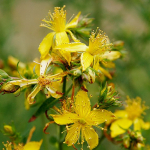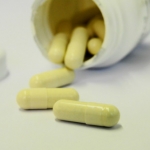St. John’s wort (Hypericum perforatum) is an herbal preparation which has been shown, in some studies, to be effective for the treatment of mild to moderate depressive symptoms. St. John’s wort is now one of the most commonly used herbal products in the United States and is widely used in Europe.
We don’t know exactly what is responsible for the antidepressant effects of St. John’s wort; however, it appears that St. John’s wort may increase levels of serotonin in the brain, which is exactly what conventional antidepressants, including the selective serotonin reuptake inhibitors or SSRIs, do.
For the treatment of premenstrual dysphoric disorder or PMDD, SSRIs are the first-line pharmacological agents and are highly effective. So it makes sense that St. John’s wort, which may also modulate serotonin levels in the brain, may also be effective for the treatment of premenstrual symptoms. However, is there any data to support its effectiveness in this setting?
A recent report has reviewed the studies assessing the effectiveness of herbal medicines, including St. John’s wort, for the treatment of premenstrual symptoms. A total of three studies looked at St. John’s wort; however, most of these studies tested the medicine in women with premenstrual syndrome (PMS) rather than PMDD. It appears that St. John’s Wort was superior to placebo for the treatment of physical symptoms but did not have a significant impact on depressive symptoms, anxiety or irritability.
So based on these findings, it seems that the SSRIs are a better first-line option for the treatment of PMDD. However, for women who cannot tolerate or do not want to take an SSRI, St. John’s Wort might be worth a try. One important thing to remember: St. John’s wort, although a naturally occurring compound, has important and potentially serious drug-drug interactions. Of particular significance in women of reproductive age is that treatment with St. John’s Wort is associated with a significant 13-15% reduction in the dose of oral contraceptives. This can result in breakthrough bleeding and contraceptive failure.
Ruta Nonacs, MD PhD
Jang SH, Kim DI, Choi MS. Effects and treatment methods of acupuncture and herbal medicine for premenstrual syndrome/premenstrual dysphoric disorder: systematic review. BMC Complement Altern Med. 2014 Jan 10;14:11. Review. Free Article
What’s popular — and what the research shows — about herbal remedies for PMS (WebMD)
Also good to know: WebMD has an excellent site for information on Vitamins and Supplements, which includes information on drug interactions and side effects.







Leave A Comment